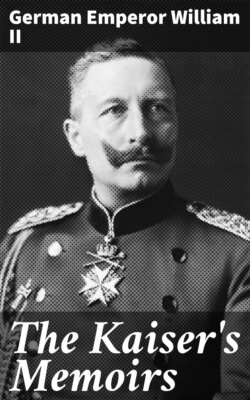Читать книгу The Kaiser's Memoirs - German Emperor William II - Страница 8
На сайте Литреса книга снята с продажи.
SOURCE OF RUSSIAN ENMITY
ОглавлениеTable of Contents
Once Prince Bismarck remarked to me that his main object was to not let Russia and England come to an understanding. I took the liberty of observing that the opportunity to postpone such an understanding for a long time lay ready to hand in 1877–78, when the Russians might have been allowed to occupy Constantinople—had this been done, the English fleet would have sailed in without further ado to defend Constantinople and the Russo-English conflict would have been on. Instead, I continued, the Treaty of San Stefano was forced upon the Russians and they were compelled to turn about at the very gates of the city which they had reached and saw before them, after frightful battles and hardships.
This, I went on, had created an inextinguishable hatred in the Russian army against us (as had been reported by Prussian officers who had accompanied the Russian army on the Turkish campaign, especially Count Pfeil); moreover, the above-mentioned treaty had been cast aside and the Berlin Treaty substituted for it, which had burdened us even more with the hostility of the Russians, who looked upon us as the enemy of their "just interests in the East." Thus the conflict between Russia and England, which the Prince desired, had been relegated far into the future.
Prince Bismarck did not agree with this judgment of "his" Congress, concerning the results of which he, as the "honest broker," was so proud; he remarked earnestly that he had wished to prevent a general conflagration and had been compelled to offer his services as a mediator. When I, later on, told a gentleman at the Foreign Office about this conversation, he replied that he had been present when the Prince, after signing the Berlin Treaty, came into the Foreign Office and received the congratulations of the officials assembled there. After he had listened to them the Prince stood up and replied: "Now I am driving Europe four-in-hand!" In the opinion of the said gentleman the Prince was mistaken in this, since, even at that time, there was the threat of a Russo-French friendship in place of the Russo-Prussian—in other words, two horses were already to be counted out of the four-in-hand. As Russia saw it, Disraeli's statecraft had turned Bismarck's work as "honest broker" into the negotiation of an Anglo-Austrian victory over Russia.
Despite considerable differences in our opinions, Prince Bismarck remained friendly and kindly disposed to me, and, despite the great difference in our ages, a pleasant relationship grew up between us, since I, in common with all those of my generation, was an ardent admirer of the Prince and had won his trust by my zeal and frankness—nor have I ever betrayed that trust.
During the time of my assignment at the Foreign Office, Privy Councilor Raschdau, among others, discoursed with me on commercial policy, colonies, etc. In these matters, even at that early date, my attention was called to our dependence upon England, due to the fact that we had no navy and that Heligoland was in English hands. To be sure, there was a project to extend our colonial possessions under the pressure of necessity, but all this could happen only with England's permission. This was a serious matter, and certainly an unworthy position for Germany.
